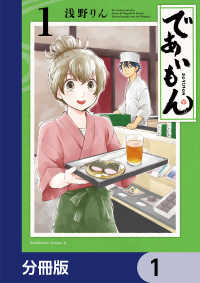- ホーム
- > 洋書
- > 英文書
- > Nature / Ecology
Full Description
This textbook, designed for introductory plant breeding courses, is tailored to fit within a single semester curriculum. Its scope is deliberately limited to serve as a practical reference for post-graduate students and horticultural plant breeders. With a clear and concise presentation style, the book aims to provide accurate and accessible information to its target audience.
Contents
Section I: Overview and Biological Foundations
1. Horticultural Crop Breeding: An Overview,
2. Plant Biotechnology: An Introduction,
3. Classical and Quantitative Genetic Basis,
4. Molecular Genetic Basis I: Markers, QTL Mapping and Marker-Assisted Selection,
5. Molecular Genetic Basis II: Association Mapping,
6. Mode of Reproduction in Relation to Horticultural Crop Breeding,
7Pollination Control Mechanism
Section II: Breeding Principles,
8. Plant Domestication: Bringing Plants under Cultivation,
9. Plant Genetic Resources: Collection, Conservationand Utilization,
10. Variation: Types and Estimation,
11. Genetic Components of Polygenic Variation andBreeding Strategies,
12. lection: Basis of Crop Breeding,
13. Heterosis and Inbreeding Depression,
14. Hybridization: Techniques and Consequences,
15. Timelines in Conventional Crop Improvement: Pre-Breeding and Breeding Procedures,
Section III: Breeding Practices,Part A: Conventional Breeding Practices,
16. Plant Introduction and Acclimatization: Sexually and Asexually Propagated Crops,
17. Methods of Selection: Heterogeneous, Homozygous Self-Pollinated Populations,
18. Methods of Selection: Segregating, Self-Pollinated Populations,
19. Methods of Selection: Cross-Pollinated Populations,
20.Heterosis Breeding: Development of Hybrid Cultivars,
21. Selection and Hybridization in Asexually Propagated Crops, Part B: Non-Conventional Breeding Practices,
22.Mutation Breeding: Sexually and Asexually Propagated Crops,
23. Polyploidy Breeding: Manipulating Chromosomes,
24.Wide (Distant) Hybridization and Introgressive Breeding,
25.Marker Assisted Selection: Assisting Conventional Methods,
26.In-Vitro Breeding: Crop Improvement Through Tissue Culture,
27.Transgenic Breeding: Crop Improvement Through Genetic Engineering, Part C: Mission-Oriented Breeding Practices,
28.Breeding for Resistance to Biotic Stresses,
29.Breeding for Resistance to Abiotic Stresses
-

- 電子書籍
- バツイチで初恋 第7話 COMIC s…
-

- 電子書籍
- このヒーラー、めんどくさい【分冊版】 …
-

- 電子書籍
- であいもん【分冊版】 1 角川コミック…
-

- 電子書籍
- ナニーと最後の独身貴族〈ブルースターの…
-

- 電子書籍
- ポケットモンスター アニキ編(1) て…



